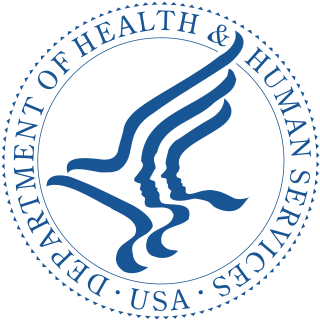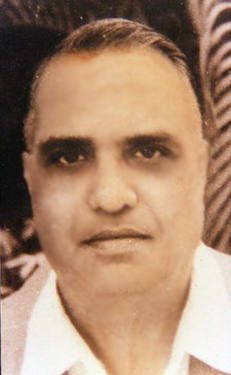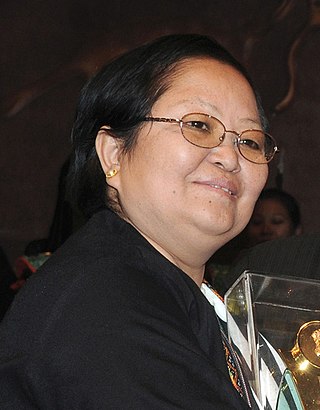
The United States Department of Health and Human Services (HHS) is a cabinet-level executive branch department of the U.S. federal government created to protect the health of the U.S. people and providing essential human services. Its motto is "Improving the health, safety, and well-being of America". Before the separate federal Department of Education was created in 1979, it was called the Department of Health, Education, and Welfare (HEW).

The Kerala model refers to the practices adopted by the Indian state of Kerala to further human development. It is characterised by results showing strong social indicators when compared to the rest of the country such as high literacy and life expectancy rates, highly improved access to healthcare, and low infant mortality and birth rates. Despite having a lower per capita income, the state is sometimes compared to developed countries. These achievements along with the factors responsible for such achievements have been considered characteristic results of the Kerala model. Academic literature discusses the primary factors underlying the success of the Kerala model as its decentralization efforts, the political mobilization of the poor, and the active involvement of civil society organizations in the planning and implementation of development policies.
The Office of Economic Opportunity was the agency responsible for administering most of the War on Poverty programs created as part of United States President Lyndon B. Johnson's Great Society legislative agenda. It was established in 1964 as an independent agency and renamed the Community Services Administration in 1975. In 1981, it was moved into the Department of Health and Human Services as the Office of Community Services, with most of its programs continuing to operate.

The National Service Scheme (NSS) is an Indian government sector public service program conducted by the Ministry of Youth Affairs and Sports of the Government of India. Popularly known as NSS, the scheme was launched in Gandhiji's Centenary year in 1969. Aimed at developing student's personality through community service, NSS is a voluntary association of young people in Colleges, Universities and at +2 level working for a campus-community linkage.

The Health Resources and Services Administration (HRSA) is an agency of the U.S. Department of Health and Human Services located in North Bethesda, Maryland. It is the primary federal agency for improving access to health care services for people who are uninsured, isolated or medically vulnerable.

Dr. Hanumappa Sudarshan is an Indian social worker and tribal rights activist. He is known for his contributions to the upliftment of the forest dwelling tribes in the Chamarajanagar district of Karnataka. He is also a recipient of the Right Livelihood Award and the Padma Shri.

Dinakara Desai was a poet, writer, educationist, and political activist. He was famous for his poetry form called chutuka. Chutuka or chutuku is a quadraplet poem. This format was later adopted by other poets. He made major contributions towards the literary development of the Uttara Kannada district of Karnataka.

Abhay Bang and Rani Bang are Indian activists and community health researchers working in the Gadchiroli district of Maharashtra, India.

Seva Mandir is an Indian grassroot NGO based in Udaipur, in Rajasthan state, founded by Dr. Mohan Sinha Mehta in 1968. Seva Mandir works mainly in natural resource development and sustainability, village development, women empowerment, education and health care, continuing education, and children's welfare.
Suman Maruti Muthe is a social worker, women's activist and writer based in Nashik, Maharashtra in India who has been actively working in the areas of child welfare and women development, particularly in the tribal belts of Maharashtra, for more than 35 years. She has initiated and implemented several projects and guided women on various aspects such as child health care, women's rights and family counselling. In recognition of her work, she has been awarded by more than 50 organisations which include the State level award by Government of Maharashtra, India, "Ahilyadevi Holkar Puraskar" given for outstanding contribution to the society in the areas of women and child development. She has also authored many books on women, tribals, sociological topics and has published and presented them at Indian and International events. Suman Muthe is married to Maruti Muthe, retired Divisional Forest Officer and has a son, Pankaj Muthe and a daughter Late Capt. Rashmi Muthe.

Swami Vivekananda Youth Movement (SVYM) is a development organization founded by a group of medicos led by Dr R Balasubramaniam based in Saragur near Mysore in the Indian state of Karnataka. The organization is engaged in building a new civil society in India through its grassroots to policy-level action in health, education and community development. For tribal They have been recognized by private and government bodies inside and outside of Karnataka. Their work in the field of AIDS prevention was recognized by the Indian government. They received awards such as the 'National Youth Award' from the Indian government, and the Mahaveer Award for work in Community and Social Service from the Mahaveer Foundation.

The National Health Mission (NHM) was launched by the government of India in 2005 subsuming the National Rural Health Mission and National Urban Health Mission. It was further extended in March 2018, to continue until March 2020. It is headed by Mission Director and monitored by National Level Monitors appointed by the Government of India.Rural Health Mission (NRHM) and the recently launched National Urban Health Mission (NUHM). Main program components include Health System Strengthening (RMNCH+A) in rural and urban areas- Reproductive-Maternal- Neonatal-Child and Adolescent Health, and Communicable and Non-Communicable Diseases. NHM envisages achievement of universal access to equitable, affordable and quality health care services that are accountable and responsive to the needs of the people.
The public healthcare system in India evolved due to a number of influences since 1947, including British influence from the colonial period. The need for an efficient and effective public health system in India is large. Public health system across nations is a conglomeration of all organized activities that prevent disease, prolong life and promote health and efficiency of its people. Indian healthcare system has been historically dominated by provisioning of medical care and neglected public health. 11.9% of all maternal deaths and 18% of all infant mortality in the world occurs in India, ranking it the highest in the world. 36.6 out of 1000 children are dead by the time they reach the age of 5. 62% of children are immunized. Communicable disease is the cause of death for 53% of all deaths in India.
Universal basic income in India refers to the debate and practical experiments with universal basic income (UBI) in India. The greatest impetus has come from the 40-page chapter on UBI that the Economic Survey of India published in January 2017. It outlined the three themes of a proposed UBI programme:

Rajnikant Shankarrao Arole was born in Supa in the Ahmednagar district of Maharashtra, India on 10 July 1934, the second child of Shankar and Leelawati Salve Arole. His parents were both schoolteachers and his father became Inspector of Schools. The Aroles raised their three sons and four daughters in the faith of the Church of England, inculcating in them Christian ethical and spiritual values that have guided Rajnikant through a lifetime of public service.
Niranjan Pranshankar Pandya is an Indian blind social worker and the secretary of Poona Blind Mens' Association, a non governmental organization working for the cause of visually impaired people of Pune and neighbouring areas. He was honored by the Government of India, in 2012, with the fourth highest Indian civilian award of Padma Shri.

Binny Yanga was an Indian social worker, a member of the National Planning Commission of India and the founder of Oju Welfare Association (OWA), a non governmental organization based in Arunachal Pradesh, working for the welfare of the weaker sections of the society and campaigning against social Illnesses such as child marriage, forced marriage and dowry. She was honored by the Government of India, in 2012, with the fourth highest Indian civilian award of Padma Shri.

Dr. Vikas Mahatme is Padmashri Awarded Indian ophthalmologist, social entrepreneur, visionary and a former member of the Parliament in Rajya Sabha. Born in Amravati, he comes from Nagpur in the state of Maharashtra. He is well known across Maharashtra for his charitable and social works. He founded a charitable trust – S. Mahatme Eye Welfare Charitable Trust that runs Mahatme Eye Bank eye hospital in Nagpur as well as branches in Mumbai, Amravati, Gadchiroli and Pune. He received the Padma Shri for his charitable community work as an ophthalmologist. In June 2016, Mahatme was the Bharatiya Janata Party's candidate for the Rajya Sabha biennial elections, which he won unopposed. His candidature was strongly backed by Maharashtra Chief Minister Devendra Fadnavis and Union Minister Nitin Gadkari. He belongs to the Dhangar community. He has expressed support for implementing Scheduled Tribe reservation for Dhangar community in Maharashtra and is its first community member to get elected to parliament. He is currently a member of the Indian Nursing Council.
Disability affects many people in Zimbabwe in both rural and urban areas. In spite of services provided by the government, philanthropists and welfare agencies, people with disabilities and their families often face several barriers. Philanthropist, Jairos Jiri, started services for people with disability in Zimbabwe in the 1940s. He is regarded as the father or founder of disability work in Zimbabwe.
Lata Desai is a medical doctor from the Indian State of Gujarat who is 1980 along with her husband Dr. Anil Desai and a few friends founded the Society for Education Welfare and Action - Rural, a voluntary organization devoted to health and development activities in the tribal area of South Gujarat.












